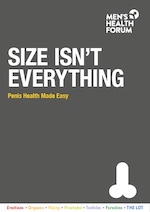Know Your Knob: all our penis health links
Premature Ejaculation FAQs
What is it?
Ejaculation which occurs more quickly than a man and his partner would wish, causing problems in a sexual relationship.
The usual problem is that a man will come during penetration itself or very soon afterwards.
What's the risk?
It's a very common problem — in fact, it's the most common sexual dysfunction affecting men.
About one in three men of all ages suffers from premature ejaculation.
What causes it?
It's very rarely caused by a physical problem.
The most common causes include stress, anxiety about sex (perhaps because of a fear of pregnancy, a sexually transmitted infection or failing to perform adequately), relationship difficulties and the lasting effects of teenage sexual experiences which had to be quick to avoid detection.
How can I prevent it?
There's not much you can do to prevent it but it may be helpful to find ways of coping with stress and resolving difficulties with your partner.
Should I see a doctor?
You should see your GP if the problem is persistent and causing you anxiety or affecting your relationship. The GP may be able to advise you about self-help measures or refer you to a specialist clinic or a qualified sex therapist.
What are the main treatments?
Sex therapy
This is normally based on two techniques:
- Stop-start. You stimulate your penis (or ask your partner to do it for you) until you're near the point of ejaculation. Then stop and rest for 30—60 seconds before stimulating your penis again. You repeat this process five or six times in each "training" session.
- Squeeze. You stimulate your penis (or ask your partner to do it for you) until you're near the point of ejaculation. This time, you or your partner firmly squeeze around your penis just below the glans (head) — put your thumb on the underside of the penis in the indent where the head meets the shaft (the frenulum) and your first and second fingers on the other side of the penis, just above and below the ridge that separates the head from the shaft. The squeeze has the effect of preventing ejaculation.
Drugs
An old treatment that is still sometimes used is local anaesthetic gel or spray applied to the penis. The idea behind this is to reduce penile sensation. Although this works in some men it is not always effective and some men are allergic to the treatment. Another problem is that the gel may be transferred to your partner during sex and anaesthetise her sensitive parts. In some cases, doctors will prescribe particular antidepressant drugs that, as a side-effect, slow down your body's progress towards ejaculation. The problems with this treatment are that you end up taking powerful medication designed to treat a completely different condition and that the drugs don't always work anyway and may have unpleasant side-effects. They are best reserved for use when sex therapy has failed to solve the problem or where the man has religious reasons not to stimulate his penis by hand.
How can I help myself?
You could try these short-term remedies (although they won't necessarily tackle the underlying problem):
- Increase the frequency of ejaculations, perhaps by masturbation. This could have the effect of delaying subsequent ejaculations.
- Wear a condom, or use an anaesthetic spray (see above), to reduce the sensitivity of your penis.
- Don't focus on penetration during sex. You may be able to ease the pressure on yourself if you don't attempt penetration until your partner has already had an orgasm.
- Talk to your partner about your problem. This may help relieve some of the pressure you feel under to perform well during sex.
- Try relaxation exercises to tackle stress. One simple but effective exercise involves tensing and relaxing each of your muscle groups in turn, starting with your feet and then moving up your body. Clench each set of muscles for a few seconds, focus on the feeling and then gradually relax. Finish with your forehead. This exercise helps counteract the muscle tension that accompanies stress.
What's the outlook?
Good. With determination and persistence, it's possible to develop good ejaculatory control.
We don't currently post comments online but are always keen to hear your feedback.
Date published
08/04/14
Date of last review
08/04/14
Date of next review
08/04/17
References
|
The Men’s Health Forum need your support It’s tough for men to ask for help but if you don’t ask when you need it, things generally only get worse. So we’re asking. In the UK, one man in five dies before the age of 65. If we had health policies and services that better reflected the needs of the whole population, it might not be like that. But it is. Policies and services and indeed men have been like this for a long time and they don’t change overnight just because we want them to. It’s true that the UK’s men don’t have it bad compared to some other groups. We’re not asking you to ‘feel sorry’ for men or put them first. We’re talking here about something more complicated, something that falls outside the traditional charity fund-raising model of ‘doing something for those less fortunate than ourselves’. That model raises money but it seldom changes much. We’re talking about changing the way we look at the world. There is nothing inevitable about premature male death. Services accessible to all, a population better informed. These would benefit everyone - rich and poor, young and old, male and female - and that’s what we’re campaigning for. We’re not asking you to look at images of pity, we’re just asking you to look around at the society you live in, at the men you know and at the families with sons, fathers and grandads missing. Here’s our fund-raising page - please chip in if you can. |



